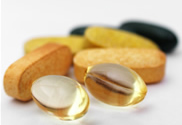The Many Benefits of Licorice and How They Can Help With Your Health
| Share on Facebook | Share on Twitter | Share on Google+ |
In recent times science has been re-discovering the health benefits of licorice. Licorice is in fact a powerful antiviral that contains 10 antioxidants, at least 25 fungicidal and 9 expectorant compounds. Licorice also includes MAO inhibitors, several XO inhibitors, and natural estrogenic ingredients. But this is not all that helps to form licorice. Licorice is also made up of beneficial components such as phytochemicals, magnesium, and sodium.
What Are The Benefits Of Licorice?
There are a number of benefits to licorice and listed below are some of the most recognized health benefits of licorice.

- Peptic Ulcers: Licorice is used in Europe as medicinal support for people suffering from ulcers. Scientific studies have also shown that licorice is very effective as a pharmaceutical drug when it comes to treating peptic ulcers. A special form of licorice known as DGL is the preferred treatment for ulcers; this form removes the glycyrrhizin from the licorice as this can cause high blood pressure. DGL has no side effects and is the inexpensive option when compared with drugs such as Tagomet and Zantac.
- HIV infection: Research has shown that the benefits of licorice can also be used in HIV related diseases. Licorice helps to slow the progression of HIV to AIDS and clinical studies carried out showed that licorice was able to slow HIV reproduction in test tubes. As you know the HIV virus targets the body's immune system and destroys white blood cells. Licorice helps to trigger the chemical compound interferon which is the body's virus fighting agent.
- Skin Problems: The health benefits of licorice also extend to internal and external skin diseases. Licorice has similar effects to hydrocortisone when applied topically and can be used to help fight dermatitis, eczema, and psoriasis . Licorice can also be used to help speed up the healing process of cold sores and has also been known to reduce the pain associated with cold sores.
- Hepatitis: Research indicates that the use of Licorice can be effective in treating both chronic and acute hepatitis. The compound glycyrrhizin in licorice is used clinically in Japan was found to be an efficient treatment in both hepatitis B and hepatitis C patients. Licorice was as effective as alpha-interferon and it did not cause the side effects associated with alpha-interferon.
- PMS: Licorice has a mild estrogenic effect. A high estrogen level can cause many menstrual problems; licorice may help to balance the estrogen levels in the body by reducing estrogen.
Other Benefits of Licorice
Some of the other benefits of licorice include:
- Respiratory System: It has always been common practice to use licorice in the treatment of severe respiratory problems such as coughing, asthma, sore throats, and bronchitis and modern research confirms these health benefits of licorice.
- Chronic Fatigue Syndrome: It is not possible to combat the effects of stress without having healthy functioning adrenal glands. Licorice supports the adrenal glands and its compound glycyrrhizic helps to block the breakdown of cortisol which in turn raises cortisol levels helping the body to fight against stress and chronic fatigue syndrome.
- Cholesterol: A study on 20 students showed that licorice makes LDL cholesterol more resistant to oxidation.
Licorice Side Effects
When looking at licorice side effects it is important to ask the question; how much licorice should I take? Licorice can raise blood pressure, cause sodium and water retention, and loss of potassium. Many experts recommend that licorice should not be used for the long term and 50 grams of real licorice is what is the daily recommended dosage according to the German Health Ministry.
Licorice consumption during pregnancy is not advised and has been associated with premature birth. Women should be extra cautious if taking licorice during pregnancy.
-
Skin CareMen Skin Care
-
Free ResourcesFree eBooks
-
Health is not simply the absence of sickness.Hannah Green
-
Featured Health SupplementTotal Balance
 contains approximately one thousand, two hundred and seventy five times LESS lead than 1 tablet of the Vitamin Shoppe product.
contains approximately one thousand, two hundred and seventy five times LESS lead than 1 tablet of the Vitamin Shoppe product.
-



















